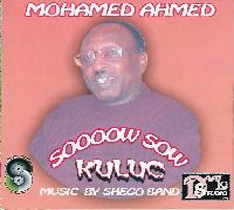Mohamed Ahmed Kuluc was born in Owdweyneh in 1942, and grew up in Berbera and Hargeisa He started his singing in Hargeisa, in the then British Somaliland Protectorate in 1954. The repertoires of his songs are long, voluminous, omnipotent and eternal, so rich and so amazingly legendary. .
The late Mohamed Ahmed Kuluc, whose career spanned more than 50 years, was known for his raspy voice, rose to fame in late 1950. For the past two decades Kuluc has been living in Britain.
Mohamed Ahmed Kuluc -Heestii Daaimow
Mohamed Ahmed Kuluc was one of the preeminent founding members of “Walaala Hargeisa Band” The legendary Somaliland band has been formed in Hargeisa in 1954. In the recent past, another Somaliland giant vocalist, the king of songs of all times, Mohamed Suleiman has also died in a strange country, a place where nobody knows his personality, and gentleness, humility, humbleness, and legendary status.
Mohamed Ahmed was one of the first generation of Bulwo or Heelo songs in Somaliland and the entire Somali speaking world for that matter. Mohamed Among the other founding members of “Walaala Hargeisa” were the likes of preeminent legends such as Abdullahi Qarshe, Mohamed Said (Guroon Jire.), Osman In-Beenale, and Shamis Abokar (Gudoodo Carwo).
The giant singer and playwright was buried on the 18th of January, 2015 in “Nasahablood cemetery in his beautiful Hargeisa.” Thousands of people including high Somaliland government officials led by Somaliland’s vice-president were in attendance.
Other great of his amazingly brilliant and irreplaceable generation who already died were Abdullahi Qarshe, Mohamed Yusuf, Mohamed Omar Huryo, Osman Mohamed Abdulkarim, Mohamed Suleiman, Omar Dhuule, Halimo Khalif Magool, Abdullahi Abdi Shube, Hussein Aw Farah, Mooge brothers Mohamed and Ahmed Mooge Liban, Farhiya Ali, and many others.
Mohamed Ahmed Kuluc - 01 - Intro (0:48)
Mohamed Ahmed Kuluc - 02 - Badda (6:21)
Mohamed Ahmed Kuluc - 03 - Badan (5:39)
Mohamed Ahmed Kuluc - 04 - Boqorkii (7:08)
Mohamed Ahmed Kuluc - 05 - Carwo (6:10)
Mohamed Ahmed Kuluc - 06 - Cosob (4:20)
Mohamed Ahmed Kuluc - 07 - Dadnimada (5:09)
Mohamed Ahmed Kuluc - 08 - Dhoolbari (8:14)
Mohamed Ahmed Kuluc - 09 - Soow Sow (6:48)








